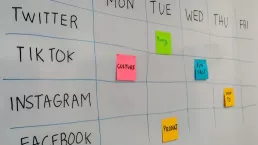Whether you've been running a business for weeks, or for years, you'll more than likely have a website which you use to promote or sell your product.
It's great isn't it, like a digital version of the old Argos book where anyone, anywhere in the world can look at what you make, sell or do and potentially become your next customer.
That is until you check in on your website only to find that it's not loading! "How's anyone going to find me if I'm offline?" might be the first question you ask yourself, most likely followed by "how long has my website been down?" and then "how many orders have I missed?"
Making sure your website is available and online 24/7 might seem like a daunting task, you're busy with orders to pack, marketing to deliver, staff to manage and other priorities. You don't have the time to sit and constantly check if your website is working.
Why Do Businesses Need to Monitor Page Uptime?
The answer to this question is extremely simple, because if your website is offline it's not making you money. Even if you're not an e-commerce site selling directly through your website, your website plays a vital role in your brand reputation. You can find out more about what uptime monitoring is and why you need to track it in this article.
If your website is offline, potential customers can't become actual customers and give you their money.
Understand The Cost of Your Website being Offline
Issues like website downtime often aren't a concern until they happen, so it helps to consider the impact of downtime of revenue.
Lets take a B2C company selling through a website, on a typical day they spend £500 on Google Ads, take 5 orders an hour and have an average order value of £75 with margin of 5%.
Per hour that's £375 of revenue and £18.75 margin lost if their website is offline. Don't forget the media spend though, if that's used wisely with day parting (so the spend is only used at peak 8 hours of the day) there's £62.50 of wasted media spend.
That means a single hour without their website online would cost £81.75! It might not sound like much, but to a small business these amounts add up. According to the Uptime Institute's Annual Outage Analysis 2024 the impact of outages can be significant:
- 54% of survey respondants said their last significant website outage cost their business more than $100,000
- 16% said the cost to their business was more than $1,000,000
While your website might not be at such a large financial risk, event the shortest of period of downtime could have catestrophic impacts for even the smallest of businesses where margins and other financial pressures are often more keenly felt.
Indirect Impacts of Website Downtime
While me might jump to thinking about the immediate impacts and costs of website downtime, not all of the consequences are felt at the time. A website affects and is affected by so many other things and so when it's unavailable there are other potential pitfalls.
Wasted Media Spend
When you website is offline and you're running ads, you're wasting additional money by paying for ads that will never convert. Ad platforms don't check if your website is offline, so they'll keep showing your adverts regardless of the user experience at the other end.
If you're working with small budgets wastage like this could really hurt your marketing efforts.
SEO
SEO isn't immune either, metrics like bounce rate are a consideration in how your website ranks, if it's offline, bounce rates will jump and this could hurt your SEO. What's more, if your site is down for a long period, search engines could stop crawling it.
SEO is all about trust, which is hard earned and easily lost.
CRM/Other Marketing Activity
We all rely on automation for so many things and marketing is no different. You might have automated or scheduled marketing activity such as email newsletters and if these are delivered at the time of a website outage, a huge chunk of your existing audience are going to have a bad experience, possibly never opening any of your emails again.
Brand Reputation
All of this boils down to brand rep. Users expect websites to be online 24/7 and if you're not there when they need you, you've lost customers, possibly for good.
Monitoring Uptime Means Better Awareness
In most businesses, there are often a whole host of cometing priorities for time, attention and resources and while everyone is busy working on the latest project, product or marketing campaign, does anyone actually take time to proactively check your website is online?
We all make the same mistake of just assuming a website is online and this is where a free website uptime monitor like PageMarshal comes into its own. Taking the step to set up an uptime monitor means you can be assured that someone has your back and will tell you if something is wrong with your website.
This means you have improved awareness and can get instant alerts if your website does fall offline and take immediate action to fix the problem.
Identify Website Hosting Problems
You might have been running your website and never felt like you had a problem with website uptime or your hosting provider. While this might be the case, it might just be that you've never encountered any issues.
Your clients on the other hand might have and just not told you. Website outages aren't always for a long time and even a short outage of a few minutes can cause lost sales or stop a client renewing a contract.
Monitoring your website uptime can help spot persistent small outages and allow your development teams to fix the cause of the problems.
Monitor Your Website Uptime for Free
So how does a busy business owner or marketing team keep on top of making sure a website is always online when customers need it? Simply, you use technology to do the work for you.
This type of tech can go by a range of names, like an uptime tracker, downtime checker or website monitoring tool, but in essence they all do the same thing, check your website at regular intervals and alert you if something's wrong.
PageMarshal Checks You're Website is Online
Our own platform, PageMarshal does just that. Simply give it a web page to monitor, tell us how often you want to check the page and it'll check your page is online for you.
If we notice that your page goes offline, gets redirected or is broken, we'll automatically send an email to the list of people you tell us to contact.




